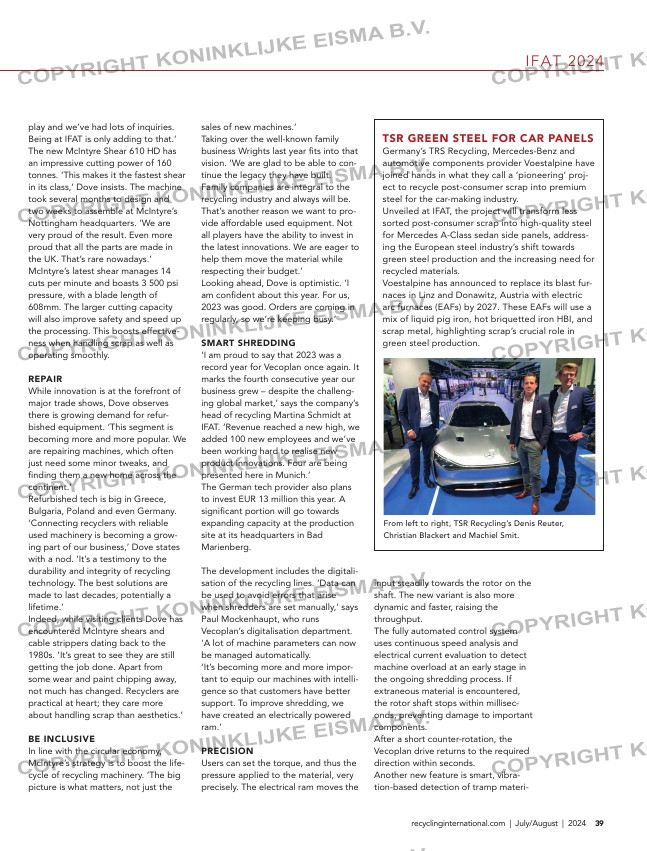Page 39 from: What’s inside issue #4?

IFAT 2024
39recyclinginternational.com | July/August | 2024
equipment to have a new lease of life.
‘Our team is here to present the latest
shear, interest in which is very strong,’
says McIntyre sales manager Harry
Dove. ‘The prototype has already
been sold. The second one is on dis-
play and we’ve had lots of inquiries.
Being at IFAT is only adding to that.’
The new McIntyre Shear 610 HD has
an impressive cutting power of 160
tonnes. ‘This makes it the fastest shear
in its class,’ Dove insists. The machine
took several months to design and
two weeks to assemble at McIntyre’s
Nottingham headquarters. ‘We are
very proud of the result. Even more
proud that all the parts are made in
the UK. That’s rare nowadays.’
McIntyre’s latest shear manages 14
cuts per minute and boasts 3 500 psi
pressure, with a blade length of
608mm. The larger cutting capacity
will also improve safety and speed up
the processing. This boosts effective-
ness when handling scrap as well as
operating smoothly.
REPAIR
While innovation is at the forefront of
major trade shows, Dove observes
there is growing demand for refur-
bished equipment. ‘This segment is
becoming more and more popular. We
are repairing machines, which often
just need some minor tweaks, and
finding them a new home across the
continent.’
Refurbished tech is big in Greece,
Bulgaria, Poland and even Germany.
‘Connecting recyclers with reliable
used machinery is becoming a grow-
ing part of our business,’ Dove states
with a nod. ‘It’s a testimony to the
durability and integrity of recycling
technology. The best solutions are
made to last decades, potentially a
lifetime.’
Indeed, while visiting clients Dove has
encountered McIntyre shears and
cable strippers dating back to the
1980s. ‘It’s great to see they are still
getting the job done. Apart from
some wear and paint chipping away,
not much has changed. Recyclers are
practical at heart; they care more
about handling scrap than aesthetics.’
BE INCLUSIVE
In line with the circular economy,
McIntyre’s strategy is to boost the life-
cycle of recycling machinery. ‘The big
picture is what matters, not just the
sales of new machines.’
Taking over the well-known family
business Wrights last year fits into that
vision. ‘We are glad to be able to con-
tinue the legacy they have built.
Family companies are integral to the
recycling industry and always will be.
That’s another reason we want to pro-
vide affordable used equipment. Not
all players have the ability to invest in
the latest innovations. We are eager to
help them move the material while
respecting their budget.’
Looking ahead, Dove is optimistic. ‘I
am confident about this year. For us,
2023 was good. Orders are coming in
regularly, so we’re keeping busy.’
SMART SHREDDING
‘I am proud to say that 2023 was a
record year for Vecoplan once again. It
marks the fourth consecutive year our
business grew – despite the challeng-
ing global market,’ says the company’s
head of recycling Martina Schmidt at
IFAT. ‘Revenue reached a new high, we
added 100 new employees and we’ve
been working hard to realise new
product innovations. Four are being
presented here in Munich.’
The German tech provider also plans
to invest EUR 13 million this year. A
significant portion will go towards
expanding capacity at the production
site at its headquarters in Bad
Marienberg.
The development includes the digitali-
sation of the recycling lines. ‘Data can
be used to avoid errors that arise
when shredders are set manually,’ says
Paul Mockenhaupt, who runs
Vecoplan’s digitalisation department.
‘A lot of machine parameters can now
be managed automatically.
‘It’s becoming more and more impor-
tant to equip our machines with intelli-
gence so that customers have better
support. To improve shredding, we
have created an electrically powered
ram.’
PRECISION
Users can set the torque, and thus the
pressure applied to the material, very
precisely. The electrical ram moves the
input steadily towards the rotor on the
shaft. The new variant is also more
dynamic and faster, raising the
throughput.
The fully automated control system
uses continuous speed analysis and
electrical current evaluation to detect
machine overload at an early stage in
the ongoing shredding process. If
extraneous material is encountered,
the rotor shaft stops within millisec-
onds, preventing damage to important
components.
After a short counter-rotation, the
Vecoplan drive returns to the required
direction within seconds.
Another new feature is smart, vibra-
tion-based detection of tramp materi-
TSR GREEN STEEL FOR CAR PANELS
Germany’s TRS Recycling, Mercedes-Benz and
automotive components provider Voestalpine have
joined hands in what they call a ‘pioneering’ proj-
ect to recycle post-consumer scrap into premium
steel for the car-making industry.
Unveiled at IFAT, the project will transform less
sorted post-consumer scrap into high-quality steel
for Mercedes A-Class sedan side panels, address-
ing the European steel industry’s shift towards
green steel production and the increasing need for
recycled materials.
Voestalpine has announced to replace its blast fur-
naces in Linz and Donawitz, Austria with electric
arc furnaces (EAFs) by 2027. These EAFs will use a
mix of liquid pig iron, hot briquetted iron HBI, and
scrap metal, highlighting scrap’s crucial role in
green steel production.
From left to right, TSR Recycling’s Denis Reuter,
Christian Blackert and Machiel Smit.
Ceo Ulrikke
Lien of
Swedish start-
up Sensorita
believes
‘digital twins’
can make the
difference
for waste
collection
companies.
URT continues to pioneer battery and fridge
recycling.
34-35-36-37-38-39-40-41_ifat2024-2.indd 39 03-07-2024 10:15



